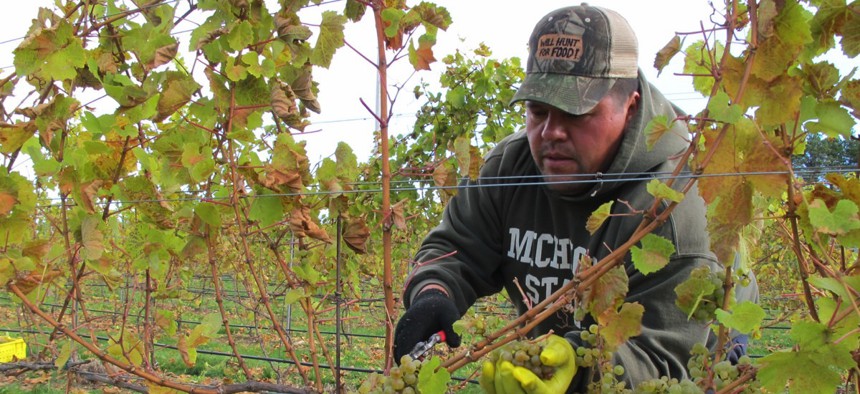Trump-Induced Labor Pains for Michigan Fruit Growers

A vineyard on the Leelanau Peninsula in Michigan. John Flesher / AP File Photo
STATE AND LOCAL NEWS ROUNDUP: Ohio’s planned review of state tax breaks hasn’t begun; controversial cloud-seeding in North Dakota; and an “atypical” case of mad cow disease in Alabama.
AGRICULTURE | Fruit growers in Michigan are facing difficulties finding enough migrant workers to pick blueberries, peaches and apples and say “political rhetoric” related to immigration coming from the President Trump and the White House has had a “chilling effect” and has contributed to the current labor shortage. An estimated 90,000-plus migrant workers arrive in the Great Lakes State every year for harvesting. [The Grand Rapids Press / MLive.com]
WORKPLACE HAZARDS | It’s not just first responders on the front lines of the opioid abuse epidemic who have to worry about the hazards posed by discarded hypodermic needles. Parks and recreation personnel who have to clean up campsites in greenbelts and other parkland. Sewage treatment plant personnel also face risks from getting accidentally stuck by a discarded needle. In Rainier, Oregon, a city about 50 miles northwest of Portland along the Columbia River, needles have been turning up in the filters of the city’s sewage treatment plant. But recent Oregon Occupational Safety and Health Division inspections found that the plant didn’t have adequate rules in place to protect workers from getting accidentally stuck, among eight workplace safety violations that were cited. [The (Longview, Wash.) Daily News]
The U.S. Department of Labor has cited a Michigan underground utility company with 10 violations and more than $100,000 in penalties after three workers died after breathing in toxic fumes in a manhole 15 feet below a Key Largo, Florida subdivision in January. [Keys Reporter via Miami Herald]
TAX CREDITS | The Ohio Tax Expenditure Review Committee was created by state lawmakers eight months ago to evaluate the $9 billion in tax credits, deductions and exemptions in the state’s tax code to see if they’re meeting their objectives or supporting economic development. But the review committee hasn’t met yet because the legislature has not yet appointed any members. Time’s a ticking: The committee’s first report is due in 11 months. [The Columbus Dispatch]
QUALITY OF LIFE | Noise complaints New York City have doubled over the past five years—2016 saw about 420,000 complains through the city’s 3-1-1 hotline. “Noise is the No. 1 complaint,” said City Councilman Ben Kallos. It’s a bigger problem than you might think. Excessive noise pollution has been linked to heightened levels of stress, hypertension and heart disease. And, it’s a problem Kallos and Costa Constantinides, a councilman from Queens, are taking seriously. The two a proposing legislation that requires noise inspectors to respond within two hours to complaints to catch the noise-makers in the act. [The New York Times]
ELSEWHERE …
Ward County, North Dakota: County commissioners are seeking to halt cloud-seeding operations that are aimed at encouraging rainfall during dry periods. The county attorney is evaluating the proposal, which is being pushed by cloud-seeding opponents. “We are not asking for a radical thing here,” one opponent said. “We are asking to join the other 47 counties in the state who do not try to modify their weather.” [Minot Daily News]
Montgomery, Alabama: An “atypical” case of bovine spongiform encephalopothy, often called mad cow disease, has turned up at an Alabama livestock market, according to the Alabama Department of Agriculture and Industries and U.S. Department of Agriculture, which characterized the discovery as "a rare and spontaneous incident." [AL.com]
Pittsburgh, Pennsylvania: City Council members will host a public meeting in September on the one-year anniversary of Uber deploying self-driving cars to city streets as part of a pilot program. The Sept. 18 meeting will include discussions about the impacts of Uber’s Pittsburgh testing on the local workforce. [The Incline]
Boise, Idaho: Despite a few “hiccups” in its early days, a new residential composting program in Idaho’s capital city has been collecting more material than had been forecasted—an average of 66 tons per day instead of the 45 tons expected. Trash volumes have decreased in the process. [Idaho Statesman]
Baltimore, Maryland: A problem that prospective jurors now face at the Clarence M. Mitchell Jr. Courthouse: Wooden benches with sharp protruding nails. “Don’t move the cushions—they’re there for your protection,” a sheriff’s deputy warned prospective jurors on Monday. [Baltimore Brew]
Albuquerque, New Mexico: A data center built by Facebook will be doubling in size. In the short term, the $250 million, 460,000 square foot building will create 1,000 construction jobs and when complete, 100 employees will be on-site. [The Albuquerque Journal]
NEXT STORY: Lobbyist Gift-Giving at Issue in More States





